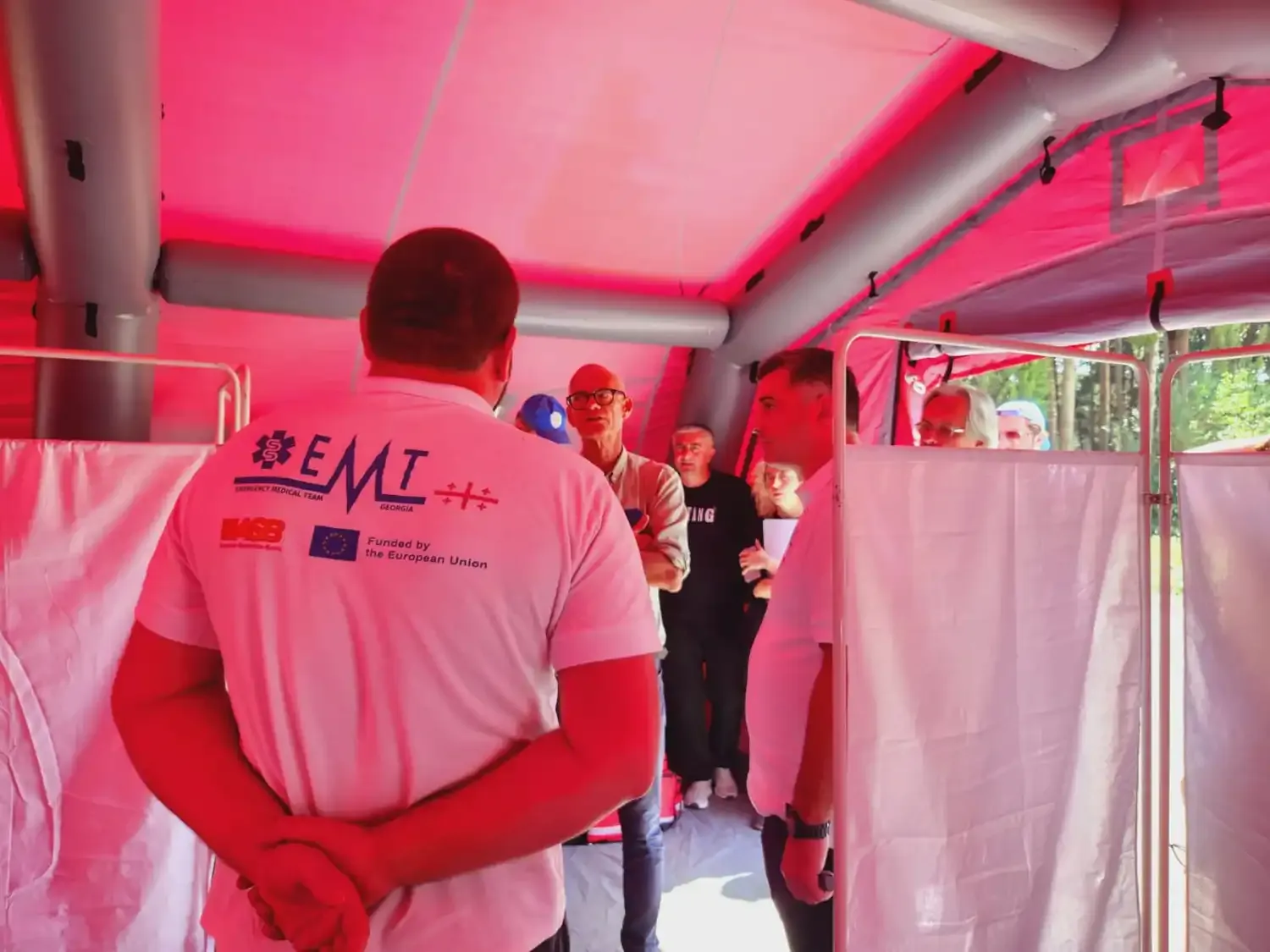Research conducted by Global Disaster Medicine - Health Needs and Response
A disaster is defined by a lack of resources: a lack of staff, lack of skill, lack of material and lack of time. Our research concerns the challenge of how we, despite the lack of resources, can provide optimal health care. On this page we present our current research. At the moment we conduct research in four areas: moral stress, needs assessment, management of conflict injuries and Emergency Medical Teams. Professor Johan von Schreeb is in overall charge of the research conducted.

Emergency Medical Teams (EMTs):
Emergency Medical Teams (EMTs) are teams of health care professionals (doctors, nurses, physiotherapists, paramedics, etc.) that provide direct clinical care to people affected by emergencies and disasters and support local health systems. EMTs are an initiative within the World Health Organization (WHO) and there are over 40 of them world-wide. They can be run either by individual states, or by NGOs and humanitarian aid organisations, and can be used both nationally and internationally.
Our research group leader, Johan von Schreeb, was part of setting up the initiative in 2010 following the chaotic international response to the 2010 Haiti earthquake. He co-authored the first version of the “Blue Book” (Classification and Standards for Foreign Medical Teams in Sudden Onset Disasters) and has significantly contributed to developing the EMT-initiative. He also co-authored the 2021 version of the Blue Book as well as the Red Book (A Guidance Document for Medical Teams Responding to Health Emergencies in Armed Conflicts and Other Insecure Environments)
We collect and analyse data from disasters where EMTs (both national and international) have been deployed and assess their contribution, and to what extent they are integrated into the health system in the affected area.
In addition to research, we also support the EMT-initiative in other ways. We serve as EMT-mentors for agencies striving to get EMT-classified, and we are part of verification missions and contribute to trainings and awareness sessions in countries that are signing up to become an EMT. Our ongoing work i is further described on our policy and expertise-page.
Needs assessments in disasters:
The intention behind needs assessment in disasters is to systematically assume the type of needs to allow optimal planning for relief in order to maximise the use of resources. Needs assessments are time sensitive and rely on rapid estimates of severity and population affected as well as systematic information on the pre-disaster vulnerability tin the affected area. Our research into needs assessment in disasters has generated two PhD thesis and remains the backbone of our work.
We continue to develop methods for timely needs assessments taking into account the changing nature of conflicts and natural disasters. We have created and tested a model to estimate and compare the severity of disasters, and our work now focuses on predicting the severity of disasters and health care needs. In doing so, we use data from recent disasters, such as the 2023 earthquake in Türkiye and Syria.
The impact of armed conflicts on health:
Our research in needs assessment in disasters feeds into our involvement in a research project called Societies at Risk, where we look at the impact of armed conflicts on health.
Societies at Risk - Anticipating the Impact of Armed Conflict, is an inter-disciplinary research project that looks at the impact of armed conflict as a hazard, exposure and vulnerability. It considers the macro and micro effects on economies, health, water security, political institutions, human rights, gender equality and forced migration. It aims to combat the fragmentation of research into multiple academic fields that limits our understanding, and instead, by working together, learn more about the full scale of conflicts’ impacts and how they can be addressed.
We are part of Societies at Risk along with Uppsala University, Universitat Autònoma de Barcelona, the International Security and Development Center (ISDC), Stockholm University, Johns Hopkins University, University of Pittsburgh, and V-Dem at University of Gothenburg. The project seeks to provide a comprehensive, multidisciplinary and forward-looking assessment that may provide well-informed decision-making and anticipatory action. The aim is to develop a comprehensive risk-based framework for empirically assessing the expected impact of armed conflict on human development. Our research specialist Anneli Eriksson is our representative in the project.
Our research concerns the understanding of the impact of armed conflict on health and we have contributed to literature reviews, and conducted cohort studies to investigate if there are any correlations between conflict intensity and health outcome at regional level in two contemporary armed conflicts. In two studies , we look at health effects on a country level, in relation to conflict intensity and vulnerability. As part of the project, we conduct qualitative studies where we seek to understand how people manage health care needs during armed conflicts. Interviews have been conducted in Sweden with persons who have been affected by conflict, and we are planning to conduct focus group discussions in Ukraine and Lebanon.
Impact of crises on health service demand and utilisation:
Akin to the topic of impact of armed conflict on health, we also study the impact of other form of crises on health service demands and utilisation. In particular, we study the effects of floods and other forms of extreme weather. Moreover, we also look at how health systems can be strengthened to cope with crises.
Our assistant professor, Dell Saulnier is co-leading a work package in a REACH project on assessing the impact of floods and extreme heat on maternal and child healthcare utilisaiton and coverage, focused on Brazil and Zambia. The aim is to better understand the characteristics that make this system vulnerable to floods and heat, as well as the characteristics that make it resilient.
Health systems resilience:
Our research focuses primarily on identifying characteristics and behaviours that generate and sustain resilience capacity. This includes looking at decision-making structures, knowledge sharing, trust and interdependence.
At present this is done among other things through our involvement in a research project, funded Forte, that looks at health systems resilience in managing the COVID-19 pandemic and what lessons can be drawn from regional preparedness plans in Sweden.
We also explore issues of power in resilience and in the outcomes of resilience interventions, as well as identifying the thresholds between the three main resilience capacities for different kinds of crises.
Our work within this field also includes a project that looks at discerning the role of the private sector in creating health system resilience, through a case study in Zambia. This project is funded by the Swedish Research Council. It focuses particularly on the role of for-profit and not-for-profit private sector actors in resilience, such as information sharing between sectors, trust and legitimacy, and organisational resilience. The aims of the project are to:
- Identify weaknesses and challenges in the process of sharing COVID-19 test information between public and private facilities in Zambia for use in diseases surveillance and monitoring
- Understand the population’s perceptions of trust in private sector health services compared to public services during the COVID-19 pandemic
Systems thinking for health systems:
Systems thinking for health systems is an approach to help understand the complexity of problems within the health system, by looking at them holistically, viewing them as interconnected, and understanding the relationships and interactions between system stakeholders and parts. Our assistant professor, Dell Saulnier was a founder of the European region of the Systems Thinking Accelerator (SYSTAC) network that promotes systems thinking for health systems.
We are currently leading a project that looks at the casual relationship between social health insurance (SHI) and financial protection, service utilisation and health outcomes, which focuses on Cambodia and is funded by the Swedish Research Council. The aims of the project are to:
- Understand how, why and under what circumstances SHI schemes influence primary health care-related health outcomes in low- and middle-income countries
- Determine the effect of the Cambodian SHI reform on primary health care service utilisation and financial protection among scheme members
- Assess the impact of the Cambodian SHI reform on the primary health care-related health outcomes of scheme members
- Explore demand- (scheme members) and supply-side (primary health care system actors) perceptions of how the Cambodian SHI scheme influences financial protection and service utilisation for primary health care services
- Understand the pathways to impact of the Cambodian SHI scheme on primary health care-related health outcomes

Moral stress and ethical challenges in disasters:
The resource scarcity that defines disasters brings with it moral challenges beyond those in normal healthcare settings. In disaster response situations, healthcare staff will be in new, often threatening, situations where they will need to make difficult decisions to prioritise among overwhelming needs. Available professional ethical guidelines are of limited use, since they do not sufficiently capture the complexity of disasters, and the pressure responders are working under.
Our research aims to better understand what determinants are crucial to moral stress and what can be done to prevent illness and suffering. In early 2024, Martina Gustavsson, defended her PhD titled Moral conflicts in health crises : Swedish health care workers’ experiences and management of moral stress, within this topic. She remains affiliated to our group and continues to conduct research in this field.
Quality assessment of intensive care in health crises and resource-limited contexts:
We have previously developed and implemented tools to assess the quality of care of critically ill patients during the COVID-19-pandemic in Lebanon. Nonetheless, the need for such tools remains large, both in low-limited contexts, where existing quality assessment tools are ill-suited due to a lack of systems for data collection, and in high-income countries, where in a health crisis, the care needs to scale up and be conducted outside of the ordinary structures. We are currently preparing for a larger project to develop a quality assessment tool to be used in intensive care in resource-limited settings.
Prioritising intensive care in health crises:
In a health crisis, regardless of what has caused it, the number of patients in need of intensive care increases. In spite of a scale up of the care, a situation could arise where the number of patients exceed the available care and prioritising must be made.
Sweden lacks a clear, transparent and clinically applicable order for prioritising patients to intensive care. We have conducted a pilot study on attitudes to prioritising patients to intensive care among medical students and our plan is for this to develop into a larger project where attitudes among the general population will be studied.
Previous research:
During our over twenty years of research, we have covered several topics within the field of disaster medicine and been involved in multiple research projects.
These include, most recently:
- Undernutrition and breast-feeding in humanitarian settings. Within our group, we have a long collective experience of both working, researching and teaching on the topic of undernutrition and breast-feeding in humanitarian setting. The latter was explored in our research affiliate Nieves Amat Camacho’s PhD thesis, titled Feeding in crisis - Exploring the Provision of Breastfeeding Support during Humanitarian Emergencies. After her PhD she has continued to support Master students who write their theses on maternal undernutrition and the outpatient management of infants under 6 months at risk of poor growth and development
- Assessment of the levels of independence and ability to conduct day-to-day activities after injury for patients in humanitarian setting, within which Bérangére Gohy defended her PhD thesis, Independence in activities after injury in humanitarian settings: assessment, change over time and associated factors in 2023
- Management of conflict injuries - Local negative pressure therapy for gunshot and explosion wounds, within which Andreas Älgå defended his PhD thesis, Wounds of war: surgical care for conflict-related injuries among civilians in resource-limited settings in 2019
- Epidemiology of conflict-related trauma in contemporary armed conflicts
